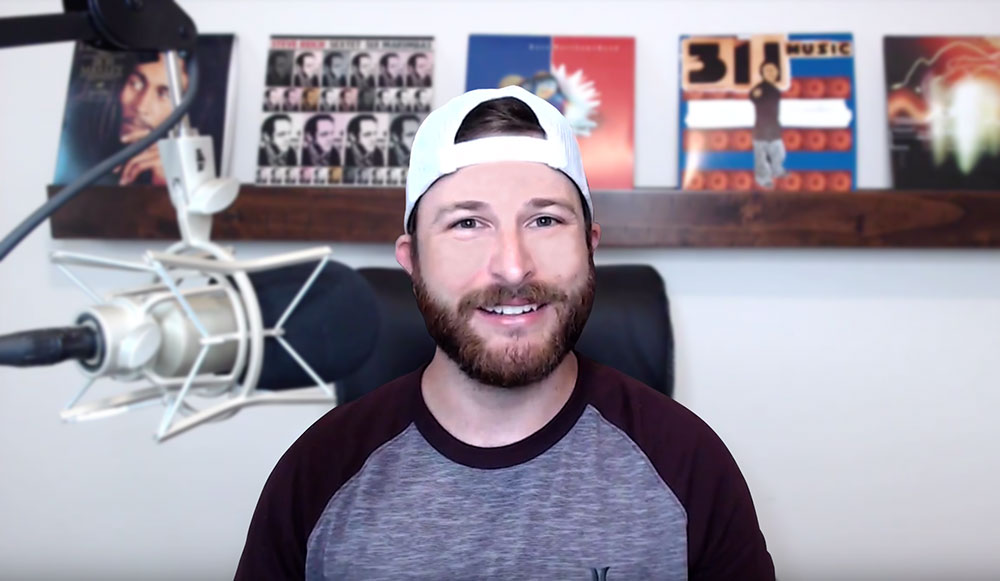How I Started A $88K/Month Personal Financial Improvement Website
Hello! Who are you and what business did you start?🔗
I’m Bobby Hoyt, former band director turned personal finance blogger and course creator. I teach millennials how to make more money, save more money, and pay off debt. I started my site, Millennial Money Man, while I was still teaching and paying off my student loan debt.
M$M is my primary business, but I also run Laptop Empires with Mike Yanda who’s an old high school friend. Our goal is to help people start and grow online businesses, and our business grew out of the success of our flagship product -- the Facebook Side Hustle Course. It teaches people how to run ads for local businesses on Facebook, which is something we both have experience with.
Mike and I went all-in with Laptop Empires after the FBSH course had a six-figure, weekend launch. Our audience is mostly millennials, but we’ve seen older students do really well with our course too. We’ve had a bunch of students hit the $5k monthly revenue mark, and many have quit their 9-5 after successfully starting their own ad agencies.
Seeing FBSH translate into real-world success has been incredibly rewarding and fuels us to keep trying new things. We’ve thrown so many ideas at the wall, and learning where to put our energy has been challenging at times, but it’s taught us to identify potential and lean on what’s working for us.
That mindset led to our second course, Facebook Ads for Bloggers. I was using FB ads to successfully grow M$M, and Mike and I knew there was space for other bloggers and content creators to do the same. They just needed the skills to run a Facebook ad campaign and translate that into revenue for their sites.
Last year we broke the seven-figure revenue mark through course sales, monthly recurring subscriptions from our coaching group, and affiliate sales.

What's your backstory and how did you come up with the idea?🔗
I had a very traditional educational experience and came out of college with $40,000 of student loan debt. I got passionate about personal finance after paying off my debt, and I made some drastic (and slightly embarrassing) moves to destroy my debt in 18 months.
I found myself teaching my students about personal finance -- not enough people are taught these lessons when they’re young. I was maybe the only band director out there who was also teaching kids about credit scores, investing, and loans. They loved it though.
Another major turning point was talking to a mentor of mine about how I wanted more than what my teacher’s salary could afford. (My readers know me for having boujee taste in wine, haha). He told me I would never be able to afford the lifestyle I wanted on a teacher’s salary. He found my pain point and challenged me to do more.
So, I put all of my energy towards paying off my debt and started M$M. It was slow at first, but after earning just $3 in Google Ads revenue, I got the ok from my amazingly supportive wife to quit my teaching job and go at the blogger thing full force. That’s not something I would ever advise, but being debt-free and having solid savings made it feasible for us.
So many of my coworkers told me I was crazy, and that I would be back within a year. That was over 5 years ago. I’m still not tempted to go back.
Take us through the process of designing, prototyping, and manufacturing your first product.🔗
As M$M started growing, I was getting emails from people desperate for a way to change their circumstances. I think people were tired of being told that cutting lattes and frugal living was the only way to reach their money goals. That can only take you so far, and it’s slow going. I choose to focus on something much more effective -- increasing your income with a side hustle.
The problem is that a lot of side hustles out there are low-paying, time-consuming, and rely on being available during normal business hours. That wasn’t good enough.
I talked to my then buddy (now business partner) Mike Yanda and he said something so profoundly simple: “Why don’t you just teach them how to do what you did, and do digital marketing on the side?”
Back when I had taken the plunge from the teacher into full-time blogger, I supplemented my income by running Facebook ads for some local businesses. My first client was the jeweler who made my wife’s engagement ring -- I had reached out and asked if I could manage his social media marketing. He said yes, and I quickly learned everything I could about running ads on Facebook, email marketing, and local SEO.
So together with Mike, who already had a successful digital ads agency he runs from home, I jumped into the world of course creation. We went from idea to course launch in 6 weeks.

Describe the process of launching the business.🔗
Our first launch (and really all of our launches) are email-based and follow a specific formula:
- Pre-launch emails on Monday, Tuesday, and Wednesday.
- The cart opens on Thursday morning.
- A morning email and evening email on Friday and Saturday.
- Three cart close emails on Sunday in the morning, afternoon, and around 8:00 pm.
We also start retargeting ads on Facebook on Friday and run them throughout the remainder of the launch.
We had a decent amount of buildup to our first launch, and most of it came via social media and a few email announcements. We did have a waitlist, which had around 900 people by the time we actually got to launch week.
Normally during our launches, we do 25% of our revenue on Thursday, 25% between Friday and Saturday, and then 50% on the last day (most of that comes after our last email goes out at 8:00 pm.
As far as the funding - we did everything out of our own pockets for the launch. Mike and I started an LLC a few weeks before the course went live, and we also paid a copywriter to help us create the sales page and the initial launch emails.
There were a few other small services we had to pay for like Teachable and Zapier, but overall our costs were less than $5,000 for the entire project from creation to launch.
We actually didn’t have an official website for Laptop Empires at the time. Everything was done from the Millennial Money Man website, email list, and social media channels for about the first six months!
We should have started putting out written content sooner than we did. We have a pretty heavy focus on SEO right now and it just takes time to build out content that ranks well.
Since launch, what has worked to attract and retain customers?🔗
In the first year, we really were just throwing everything at the wall that we possibly could. We made a lot of new products and basically chased every dollar we could. It was stressful, to be honest. It felt like we always had to find new ways to sell in order to keep revenue coming in. Nothing was easy or automatic.
We didn’t have much of a social media presence for Laptop Empires, and we didn’t even have a website until around month 6 of our first year in business.
We relied very heavily on the audience, traffic, and email list that I had built with Millennial Money Man to promote our products. Laptop Empires were not self-sufficient.
That changed in year two of the business. We brought in writers for the blog, started running more Facebook ads and Google ads, as well as bringing in a consultant to help us build out our tracking and sales attribution.
Most of our sales come from email marketing, although we have been working to crack the code on direct sales from advertising and have seen a lot of progress on that front.
The key for us is to build our audience. We know that if we bring people into our world, they’ll start to consume our content and eventually buy a product from us. That’s why we produce so much content, whether it’s the blog, podcast, YouTube channel, or our newsletter that goes out to our list three times per week (which is around 30,000 right now).
Our tracking suite built out in Woopra allows us to understand how our customers interact with our content, and which articles, podcasts, and emails eventually lead to sales. The great thing is that we don’t have to guess where our sales are coming from anymore -- we have that data and can use it to make informed decisions on the type of content and products we create.
How are you doing today and what does the future look like?🔗
Right now we’re in a great place. Our group subscription, which is $47/month and is attached to the back end of our courses, allows us to bring in consistent revenue every month.
Many course creators (especially in the personal finance space) aren’t really believers of the paid support group model. But for us, it’s been absolutely vital to making sure that we can grow the business sustainably.
We start off every month knowing what our baseline of revenue will look like (currently around $30k per month recurring and growing), which essentially covers our team, writers, ad spend, any investments we want to make in terms of consultants or web design, and then some. From there, everything else as far as course sales are profit.
While our courses focus on Facebook ads, we’re currently looking to expand our offerings. We have a freelancer client acquisition course on the way, an email marketing course, we’re going to expand our coaching group to be a standalone product, and we’re also working on higher-end products that teach people how to sell info products and start full-blown ad agencies.
Through starting the business, have you learned anything particularly helpful or advantageous?🔗
If I could go back in time, I would say we should have started putting out written content sooner than we did. We have a pretty heavy focus on SEO right now, and as most people know it just takes time to build out content that ranks well.
I also wish we had taken more of a focused approach in year one. After making six-figures in our first weekend as a business, it felt like we just went after every single opportunity we could to keep it going, rather than trying to build out a foundation for the business with traffic streams and increasing our revenue with current customers rather than always trying to find new ones.
Sales attribution is a matter of having every link be structured correctly in every single piece of content you create and distribute. It’s the little things that matter in the attribution game.
What platform/tools do you use for your business?🔗
Currently, we have a website for Laptop Empires which houses our blog and course sales pages, as well as a podcast, YouTube channel, and of course Facebook page.
Our courses are hosted on Teachable and payments are processed through Thrivecart, although we are currently working on migrating the course over to our own website. All of the course material itself was recorded via Loom, and we have weekly coaching calls inside of our support group using Zoom.
Our private support group is on Facebook, although we are going to move much of the live training content in the group to an actual members area on the website when that project is completed.
We also use Woopra for all of our ends to end customer journey data. It’s not a cheap program, but it’s crazy powerful and allows you to look at your data in every way you would ever even think to do it.
What have been the most influential books, podcasts, or other resources?🔗
As far as books go, my business partner, Mike, would probably say Work Less, Make More by James Schramko. My personal favorite is Company of One by Paul Jarvis, which really changed my perspective on how I wanted to grow my business… but more importantly why.
I think for both of us, the idea behind what we’re trying to accomplish with Laptop Empires and the reason we gravitate toward these books is pretty simple:
We want to make great money, but also create more time for ourselves.
Growing a great business that helps you build wealth is amazing, but we want to make sure that we’re doing it in a way that fits the lifestyle we actually want. The last thing we want to do is grow just for the sake of growth or to impress other people.
We see story after story of entrepreneurs that increase the size of their businesses to the point where they feel trapped by them or don’t have time to hang out with their family because they always work. Our goal is to not have that happen, which means being more intentional with how we work, how many people we hire, and how many projects we take on at once.
We also follow advice from people like Chris Orzechowski over at TheEmailCopywriter.com (he’s an email marketing wizard), and Larry Ludwig over at LarryLudwig.com (he’s our tracking consultant who sold his former blog, Investor Junkie, for $6 million).
Advice for other entrepreneurs who want to get started or are just starting out?🔗
This might not be the most common advice out there, but my recommendation, ESPECIALLY for someone that is going to start an online business is to get your tracking in order.
I had no idea how cookies worked, what UTM parameters were, and wasn’t nearly organized enough about using these pieces from the beginning.
It’s one thing to generate great revenue with course sales or affiliate marketing. It’s another thing entirely to correctly attribute those sales and figure out the best places to reinvest money into your business to increase revenue with less waste.
Sales attribution is a matter of having every link be structured correctly in every single piece of content you create and distribute. It’s the little things that matter in the attribution game.
The other piece I have (which is much more general advice), is to just be patient. Building a business takes a lot longer than you probably think it will or want it to take.
Even though we had quick success with Laptop Empires, it was really only because of the time Mike and I had put into learning digital marketing the years prior, and because of how much work I had put into building an audience over at Millennial Money Man.
Are you looking to hire for certain positions right now?🔗
We aren’t currently. We are built out fairly well at the moment. We currently have 3 writers, a content manager, and editor, several virtual assistants, three coaches in our support community, a community manager, and a support guru to help with anything our students need.
Where can we go to learn more?🔗
For more information on Millennial Money Man
- Website
- The Millennial Money Man Community on Facebook
For more information on Laptop Empires

Download the report and join our email newsletter packed with business ideas and money-making opportunities, backed by real-life case studies.

Download the report and join our email newsletter packed with business ideas and money-making opportunities, backed by real-life case studies.

Download the report and join our email newsletter packed with business ideas and money-making opportunities, backed by real-life case studies.

Download the report and join our email newsletter packed with business ideas and money-making opportunities, backed by real-life case studies.

Download the report and join our email newsletter packed with business ideas and money-making opportunities, backed by real-life case studies.

Download the report and join our email newsletter packed with business ideas and money-making opportunities, backed by real-life case studies.

Download the report and join our email newsletter packed with business ideas and money-making opportunities, backed by real-life case studies.

Download the report and join our email newsletter packed with business ideas and money-making opportunities, backed by real-life case studies.











